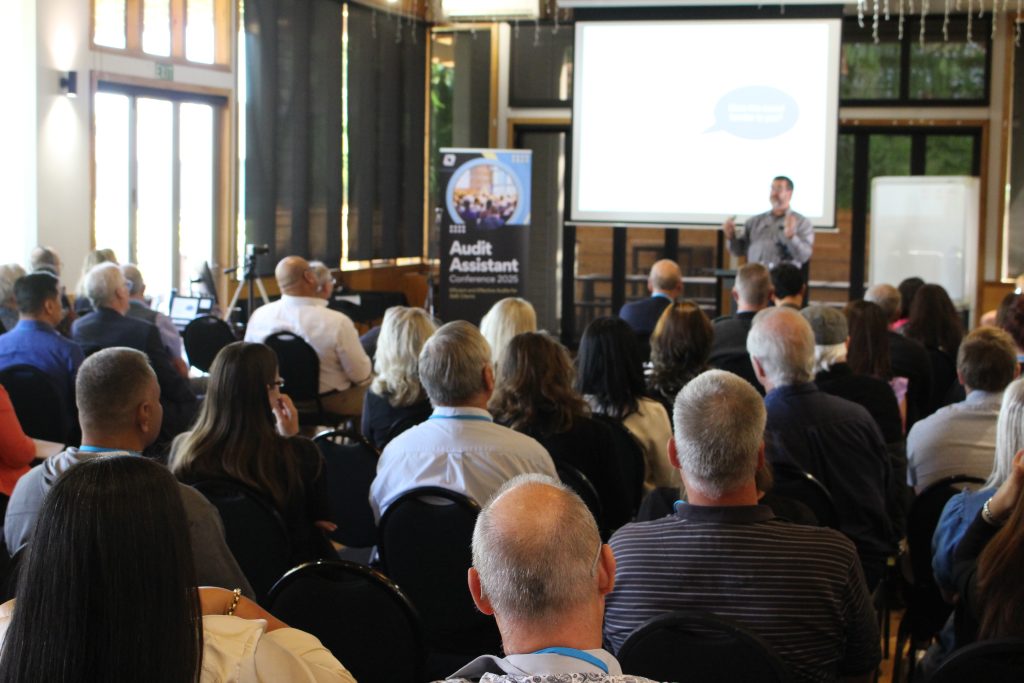In his 2009 book Start With Why, and accompanying record-breaking TED talk, Simon Sinek describes how unless we understand and can articulate why we do what we do we are likely to get hung up in the how and the what, losing our vision and our joy. Returning to the why will truly keep us motivated and build deep quality and value into our business that will set it apart.
Auditors generally know what we do – we’re auditors, we audit, some know how to do it better than others, and we talk about that a lot: processes, techniques, tools, tips and tricks – but how often do we think about why?
That’s easy, you say, to make a profit. But Sinek says making a profit is not a why, it’s a result. By your why he means your purpose, your cause, your belief. Why do we exist? People don’t buy what you do so much as why you do it.
So why auditing?
Could it be that the difficulty we are having attracting people to our profession at the moment is a lack of vision about why we do what we do?
Maybe we need to understand our history to recover the importance of our work. Some of the earliest writing ever found apparently consisted of accounting records. As societies and culture emerged and trading became common record keeping became more important.
If you just swap goods with your neighbour who you know, there is no need for an auditor. Then people in your village or from the next village who you don’t know might trade with you. If you have a bad experience you would just not trade with them again and word would spread so they would have to amend their ways . But when you sold to a middleman who would then on-sell your clay pots or whatever to someone else who you may not know then some records were required. And who was to say those records were legitimate or true and fair? Who would ensure accountability? Some sort of auditor – often appointed by the rulers to ensure that corruption was kept at bay and all the subjects were treated fairly.
Watching and listening
In ancient Hebrew society we see the proto-auditor emerging in the role of the prophet. For instance, the Old Testament prophet Habakkuk says:
“I will stand at my guard post
Habakkuk 2:1-3
And station myself on the watchtower;
And I will keep watch to see what He will say to me,
And how I may reply when I am reprimanded.
Then the LORD answered me and said,
“Write down the vision
And inscribe it clearly on tablets,
So that one who reads it may run.”
This has a lot of resonance for our profession. The prophet was the one called to watch and listen from the watchtower on the wall (the word audit come from a Latin word meaning to listen), receiving instruction from the regulator – God in this case – who had the power to reprimand both the prophet and anyone acting unjustly. This was in accordance with the agreed standards – the Torah– literally the instructions given for a just society where widows and orphans and strangers are cared for, debts were just and no excessive burdens were placed on people through exploitation.
The prophet was to record what was heard and observed in way that was clear and understandable – that it would be sent by a runner to someone who could read it, get the whole picture and make an informed decision – the ideal audit file.
Sometime the prophets were rebuked for their complicity with the corrupt institutions. Here were those who were called to enable a just and fair society – the sub-regulators – getting cosy with the big-boys for gain or power. There was clear lack of independence and professional scepticism leading to lack of credibility.
Auditing the psychos
Later we had the emergence of the corporation – a made-up entity with legal personhood. In her book Six Capitals (subtitled “can accountants save the planet?”) Jane Gleeson-White describes the corporation as having –
“…entitlement to all rights with few responsibilities apart from self-aggrandisement (which) might be deemed (in a human) to be psychopathic.”
She talks about how applying the DSM-IV Diagnostic and Statistical Manual of Mental Disorders ranks the modern corporation as psychopathic – they hide their behaviour, sacrifice long-term welfare for short-term profits, are aggressively litigious, exploitive of workers etc. (pg xvii)
So, we have auditor as the hero of the just society, the prophet, adjudicator of justice, tamer of the psychopathic corporation.
Overloading the donkey
But probably your clients aren’t like ENRON or the Eye of Sauron. They’re more like your local bowls club, play centre, or charity. Why are we working for these? Because they provide the social capital that holds our communities together. In an increasingly online world real community connection is getting harder to find, and they are struggling to function.
Solicitor Susan Barker in an article on the proposed taxing of charities said:
“The Government consistently expresses how important charities are to our society, but then in the same breath looks to slap unnecessary restrictions on them. Charities running businesses are, by definition, social enterprises: charities should be encouraged to run businesses to raise funds for their charitable purposes, to reduce their reliance on donations and government funding. Research indicates that charities carry out their services more efficiently and effectively than government. If tax law cause charities to reduce their services, and government has to pick up the slack, the net impact on government revenue is likely to be negative rather than positive.”
Our work as auditors of not-for-profits has a direct impact on their level of trust in the community. Our work must be fair, reliable and efficient to enable this sector to survive and hopefully thrive.
Why Audit Assistant?
Which brings us to the why of Audit Assistant. On the front page of our website, we say:
“Auditing is a means to support a robust, caring society through encouraging accountable and transparent business practices. Auditors support not only businesses providing employment and social stability, but a multitude of small charities, clubs and social enterprises doing good out there. We love making great, innovative software in collaboration with our users. Supporting auditors in their work and doing it with style is why we make Audit Assistant.”
The first part reflects the why of auditing. We find a resonance with many of our users because this is why you do what you do. You see a social good in your work, and you love working with people who share that vision.
My auditing background began at Hutchison Hull (later Deloitte), at No. 1 Queen street in Auckland, NZ. Then after a couple of years working on big jobs like Farmers, Kiwi Bacon Co and Ceramco, I left for smaller practices, first in Auckland then later in the Far North and later in Whangarei. The whole approach was obviously significantly different.
The codified auditing standards prompted the development of version 1 that I used for my own work – an Excel based product that I developed beginning around 1999 eventually marketed through Solution 6. This version was further developed and marketed through Solution 6 and Matt came on board to develop a Microsoft .NET front end for online updates.
With the demise of Solution 6 and the introduction of the ISAs Matt and I agreed that we follow the path of the newly introduced Xero into the online cloud-based delivery – Software as a Service, or SaaS. This was a huge job from both the software and content perspective. Nick, our newest director, was also on the fringes at that point. We formed the present Company in 2008. So, version 2 was born. We grew and added more to our team and became the go-to product in the NZ SME audit market – thanks to all our users.
Looking after local
One of the reasons we made Audit Assistant was that I saw the pressure coming on smaller and provincial firms – like the ones where I had worked – to shut up shop and tell the small charities, clubs and social enterprises that they support, to just go away – either find a big city firm that has much more expensive overheads and charges or just shut down.
And the pressure is still coming from all angles – government talking about taxing charities, standard setters enforcing international standards that are arguably more appropriate for psychopathic corporations than small clubs and charities, regulators of all sorts imposing extra laws and regulations of all sorts that just hobble the overworked donkey to death.
Many of these things we can’t change, but we can stand with our users and do our best to help them do a professional job that hopefully enables them to employ local people who know the community – and to return a profit.
Collaboration and connection
Another part of our why is in the statement “We love making great, innovative software in collaboration with our users.” We treat product development as a joint project with you. Our very high value is to respond to user problems, questions, and suggestions promptly and personally. You won’t be talking to any robots or getting AI responses. We enjoy knowing our users and working with them. That’s why we like to do our training and conferences live. We know the value of face-to-face interaction and networking.
The last part of the statement on our website says: “Supporting auditors in their work and doing it with style is why we make Audit Assistant.” The “in style” is important. Our work is creative and it’s interactive. We enjoy bouncing ideas off each other to get the best outcome. Every team member brings a unique contribution.
And the purpose of this – as I’ve titled this article, is to build value – not just monetary value, but building a great team, a great work experience, a great service or product, by leading from your values – your why.
This is what we have tried to build with Audit Assistant. One of the things that has delighted me about Audit Assistant is the loyalty of our subscribers. Sinek says:
“Knowing you have a loyal customer and employee base not only reduces costs, it provides massive peace of mind. Like loyal friends, you know your customers and employees will be there for you when you need them most. It’s the feeling of “we’re in this together.””
Building on a foundation of why builds quality all the way down.
Why do you do what you do? Sinek draws what he calls a Golden Circle – with why at the centre flowing out to how and what. Once we’ve got the why then the how becomes more focussed, and the what becomes easier.
By Clive McKegg – This article is based on a keynote presentation I gave at our Conference in March 2025.






